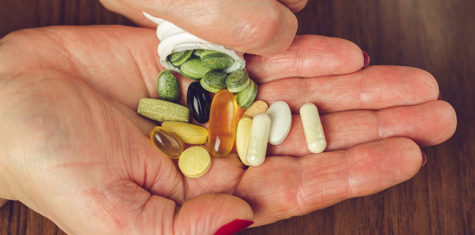About Vitamins
Vitamins are potent organic compounds which are found in small concentrations in foods. They perform specific and vital functions in the body chemistry. They are like electric sparks which help to run human motors. Except for a few exceptions, they cannot be manufactured or synthesized by the organism and their absence or improper absorption results in specific deficiency disease.
Vitamins A, D, E and K are all soluble in fat and fat solvents and are therefore, known as fat-soluble. They are not easily lost by ordinary cooking methods and they can be stored in the body to some extent, mostly in the liver. They are measured in international units.
Vitamin B Complex and C are water soluble. They are dissolved easily in cooking water. A portion of these vitamins may actually be destroyed by heating. They cannot be stored in body and hence they have to be taken daily in foods. Any extra quantity taken in any one day is eliminated as waste. Their values are given in milligrams and micrograms, whichever is appropriate.
The various functions of common vitamins, their deficiency symptoms, and natural sources are discussed in brief as follows:
Vitamin A
Known as anti-opathalmic, vitamin A is essential for growth and vitality. It builds up resistance to respiratory and other infections and works mainly on the eyes, lungs, stomach and intestines. It prevents eye diseases and plays a vital role in nourishing the skin and hair. It helps to prevent premature ageing and senility, increases life expectancy and extends youthfulness.
The main sources of this vitamin are fish liver oil, liver, whole milk, curds, pure ghee, butter, cheese, cream and egg yolk, green leafy and certain yellow root vegetables such as spinach, lettuce, turnip, beets, carrot, cabbage and tomato and ripe fruits such as prunes, mangoes, papaya, apricots, peaches, almonds and other dry fruits.
A prolonged deficiency of vitamin A may result in inflammation of the eyes, poor vision frequent colds, night blindness and increased susceptibility to infections, lack of appetite and vigor, defective teeth and gums and skin disorders.
B Complex Vitamins
There are a large variety of vitamins in the B group, the more important being B1 or thiamine, B2 or riboflavin, B3 or niacin or nicotinic acid, B6 or pyridoxine, B9 or folic acid, B12 and B5 or pantothenic acid. B vitamins are synergistic. They are more potent together than when used separately.
- Thiamine
Known as anti-beberi, anti-neuritic and anti-ageing vitamin, thiamine plays an important role in the normal functioning of the nervous system, the regulation of carbohydrates and good digestion. It protects heart muscle, stimulates brain action and helps prevent constipation. It has a mild diuretic effect.
Valuable sources of this vitamin are wheat germ, yeast, the outer layer of whole grains, cereals, pulses,nuts, peas, legumes, dark green leafy vegetables, milk, egg,banana and apple.
The deficiency of thiamine can cause serious impairment of the digestive system and chronic constipation, loss of weight, diabetes, mental depression, nervous exhaustion and weakness of the heart.
- Riboflavin
Vitamin B2 or riboflavin, also known as vitamin G, is essential for growth and general health as also for healthy eyes, skin, nails and hair. It helps eliminate sore mouth, lips and tongue. It also functions with other substances to metabolize carbohydrates, fats, and protein.
The main sources of this vitamin are green leafy vegetables, milk, cheese, wheat germ, egg, almonds, sunflower, seeds, citrus fruits and tomatoes.
Its deficiency can cause a burning sensation in the legs, lips and tongue, oily skin, premature wrinkles on face and arm and eczema.
- Niacin
Vitamin B3 or niacin or nicotinic acid is essential for proper circulation, healthy functioning of the nervous system and proper protein and carbohydrate metabolism. It is essential for synthesis of sex hormones, cartisone, thyroxin and insulin. It is contained in liver, fish, poultry, peanut, whole wheat,green leafy vegetables, dates, figs, prunes and tomato.
A deficiency can lead to skin eruptions, frequent stools, mental depression, insomnia, chronic headaches, digestive disorders and anemia.
- Pyridoxine
Vitamin B 6 or pyridoxine is actually a group of substance – pyridoxine, pyridoxinal and pyridoxamine – that are closely related and function together. It helps in the absorption of fats and proteins, prevents nervous and skin disorders and protects against degenerative diseases.
The main sources of this vitamin are yeast, wheat, bran, wheat germ, pulses, cereals, banana, walnuts, soy beans, milk, egg, liver, meat and fresh vegetables.
Deficiency can lead to dermatitis, conjunctivitis, anemia, depression, skin disorders, nervousness, insomnia, migraine headaches and heart disease.
- Folic Acid
Vitamin B9 or folic acid, along with vitamin B12 is necessary for the formation of red blood cells. It is essential for the growth and division of all body cells for healing processes. It aids protein metabolism and helps prevent premature graying.
Valuable sources of this vitamin are deep green leafy vegetables such as spinach, lettuce, brewers yeast, mushrooms, nuts, peanuts and liver.
A deficiency can result in certain types of anemia, serious skin disorders, loss of hair, impaired circulation, fatigue and mental depression.
- Pantothenic Acid
Vitamin B5 or pantothenic acid helps in cell building, maintaining normal growth and development of the central nervous system. It stimulates the adrenal glands and increases the production of cortisone and other adrenal hormones. It is essential for conversion of fatty and sugar to energy. It also helps guard against most physical and mental stresses and toxins and increases vitality.
The main sources of this vitamin are whole grain bread and cereals, green vegetables, peas, beans, peanuts and egg yolk. It can be synthesized in the body by intestinal bacteria.
A deficiency can cause chronic fatigue, hypoglycemia, graying and loss of hair, mental depression, stomach disorders, blood and skin disorders.
- Vitamin B12
Vitamin B12 or cobolamin, commonly known as “red vitamin” , is the only vitamin that contains essential mineral elements. It is essential for proper functioning of the central nervous system, production and regeneration of red blood cells and proper utilization of fat, carbohydrates and protein for body building. It also improves concentration, memory and balance.
Valuable sources of this vitamin are kidney, liver, meat, milk, eggs, bananas and peanuts. Its deficiency can lead to certain types of anemia, poor appetite and loss of energy and mental disorders.
- Vitamin C
Vitamin C or ascorbic acid is essential for normal growth and the maintenance of practically all the body tissues, especially those of the joints, bones, teeth, and gums. It protects one against infections and acts as a harmless antibiotic. It promotes healing and serves as protection against all forms of stress and harmful effects of toxic chemicals. It helps prevent and cure the common cold. It also helps in decreasing blood cholesterol.
This vitamin is found in citrus fruits, berries, green and leafy vegetables, tomatoes, potatoes, sprouted sprouted bengal (a variety of chickpea) and green grams (mung beans).
A deficiency can cause scurvy marked by weakness, anemia, bleeding gums and painful and swollen parts, slow healing of sores and wounds, premature ageing and lowered resistance to all infections.
- Vitamin D
Vitamin D is necessary for proper bone and teeth formation and for the healthy functioning of the thyroid gland. It assists in the assimilation of calcium, phosphorus and other minerals from the digestive tract.
This vitamin is found in the rays of the sun, fish, milk, eggs, butter and sprouted seeds. A deficiency can cause gross deformation of bones and severe tooth decay.
- Vitamin E
Vitamin E is essential for normal reproductive functions, fertility and physical vigor. It prevents unsaturated fatty acids, sex hormones and fat soluble vitamins from being destroyed in the body by oxygen. It dilutes blood vessels and improves circulation. It is essential for the prevention of heart diseases, asthma, arthritis, and many other conditions.
It is available in wheat or cereals germ, whole grain products, green leafy vegetables, milk, eggs, all whole, raw or sprouted seeds and nuts.
Its deficiency can lead to sterility in men and repeated abortions in women, degenerative developments in the coronary system, strokes and heart disease.
- Vitamin K
Vitamin K is necessary for the proper clotting of blood, prevention of bleeding and normal liver functions. It aids in reducing excessive menstrual flow.
This vitamin is contained in egg yolk, cow’s milk, yogurt, alfalfa, green and leafy vegetables, spinach, cauliflower, cabbage and tomato. Its deficiency can lead to sufficient bile salts in the intestines, colitis, lowered vitality and premature ageing.
Source:
This information came from A Complete Handbook of Nature Cure, a complete handbook of Naturapathic Medicine. For more in depth information on vitamins, and vitamin therapy visit this post, The Importance of Vitamins, over at Alternative Therapies.





Leave a Reply